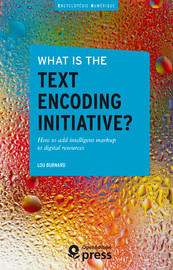

The Text Encoding Initiative (TEI) is a consortium which collectively develops and maintains a standard for the representation of texts in digital form. Its chief deliverable is a set of Guidelines which specify encoding methods for machine-readable texts, chiefly in the humanities, social sciences and linguistics. Since 1994, the TEI Guidelines have been widely used by libraries, museums, publishers, and individual scholars to present texts for online research, teaching, and preservation. In addition to the Guidelines themselves, the Consortium provides a variety of resources and training events for learning TEI, information on projects using the TEI, and software developed for or adapted to the TEI.
P5 is a major revision of the TEI Guidelines that offers many new and improved features. Get the P5 Guidelines The TEI Guidelines, including the TEI schemas, the TEI source code, and the prose documentation, are published as open source software. They can be accessed and downloaded in a variety of forms, depending on how you want to use them.
Inside Scholarly Editing: encoding guidelines
 What is the Text Encoding Initiative? : how to add intelligent markup to digital resources
by
Lou Burnard
What is the Text Encoding Initiative? : how to add intelligent markup to digital resources
by
Lou Burnard
DATA DICTIONARY GENERATOR v. 2.0 Last updated: September 1, 2015 I: INTRODUCTION The Data Dictionary Generator (DDG) is a tool that helps project editors quickly generate encoding documentation. It reads in a TEI-encoded file, and compares that to both the official TEI Guidelines and any local guidelines (if provided) and outputs an HTML-formatted report that can be viewed on a computer or published to the web. This work is licensed under the Creative Commons Attribution-ShareAlike 4.0 International License. To view a copy of this license, visit http://creativecommons.org/licenses/by-sa/4.0/. Joe Easterly Digital Humanities Librarian River Campus Libraries, University of Rochester
Explore. Discover. Create.
24255 Pacific Coast Highway, Malibu, CA 90263 Phone: 310.506.7273Copyright © 2025 Pepperdine University